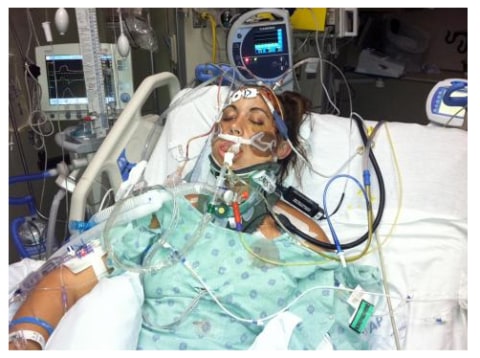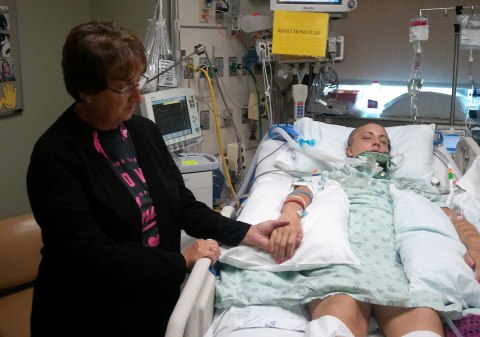http://www.nbcnews.com/health/health-news/spectacular-recovery-state-fair-stage-collapse-victim-n47406'Spectacular' Recovery for State Fair Stage Collapse Victim
By Linda Carroll
This story of survival is part of the Dateline report "Twist of Fate"
Andrea Vellinga can’t remember anything about the steamy August day that forever changed her life—not the trip to the 2011 Indiana State Fair, not the horrific stage collapse, not the object that careened down on her head, cracking her skull and bruising her brain.

Andrea Vellinga was injured when the stage at the Indiana State Fair collapsed in 2011.
As ominous black clouds barreled toward the Indianapolis fair grounds on Aug. 13, Vellinga was in the crowded “pit” at the base of the stands waiting for her favorite band, Sugarland, to come on stage. When the storm struck, it was violent. Heavy winds ripped at the rigging of the towers at the front of the stage and, in a matter of moments, sent the structure crashing down on the crowd below. Seven people died. Dozens were injured.
It was Vellinga’s good luck that a physician and her paramedic husband were in the stands. The couple spotted the unconscious 30-year-old mom lying on the ground, got her onto a makeshift stretcher and then into an ambulance.
It was her bad luck that the injury to her brain was so severe doctors feared she wouldn’t survive, let alone go back to her old life.
“The majority of patients with that kind of injury do not have a good outcome.”"The majority of patients with that kind of injury do not have a good outcome," said Dr. Richard B. Rodgers, the neurosurgeon who removed part of Vellinga’s skull in an attempt to bring down the rapidly building pressure on her brain.
“Many die or are comatose for a long period of time or end up in a persistent vegetative state,” said Rodgers, director of neurotrauma at Indiana University Health.
But Vellinga beat all the odds. Her recovery was “spectacular,” Rodgers said. “This type of recovery you see in one in a couple thousand patients.

Fans at a Sugarland concert attempt to hold up the stage after high winds blew the stage over at the Indiana State Fair Grandstands, Saturday, Aug. 13, 2011, in Indianapolis. (AP Photo/The Indianapolis Star, Matt Kryger)
Although she doesn’t know for sure yet, Vellinga is convinced that her remarkable recovery is due in large part to an experimental medication. Not long after she arrived at the hospital, officials approached her mother, Sandi Voss, about a clinical trial. If Voss signed up her daughter, Vellinga had a 50 percent chance of getting the medication -- and a 50 percent chance of getting a placebo.
“We . . . thought if this is something that can help anyone else, no matter what her outcome is, if she doesn't even survive, if they can find good research from this and it will help people in the future, there was no question about whether Andrea would want that,” Voss told Dateline, which reports Sunday about the impact of the stage collapse on Vellinga and others.
The multicenter Synapse Trial, which was started in June of 2010 by BHR Pharma, LLC, was designed to test whether intravenous infusions of the hormone progesterone would help protect nerve cells from damage that occurs after the initial injury to the brain. Ultimately 154 sites and 1,180 patients participated in the trial.
Because it is a double-blind study, neither the patients nor their doctors know who got the medication and who got the placebo.
Scientists first started looking at the hormone three decades ago when researchers noticed that female rats recovered better from brain injury if they were at a point in their reproductive cycles when progesterone levels are high.
Though progesterone is produced in the brains of both males and females, levels are much higher in females, said Don Stein, a member of the team who made the initial discovery and who is now the Asa G. Candler professor and distinguished professor of emergency medicine at Emory University in Atlanta.
To learn whether progesterone really was key to better recovery, Stein and his colleagues injected brain injured males the hormone to see if it would protect them, too. It did.
Over the years, numerous researchers have discovered that progesterone has widespread impact: it quells inflammation, promotes the growth of nerve cells and also appears to help the brain rewire. Progesterone levels are highest in pregnant women.
“It’s a complicated and potent developmental hormone that I think helps protect the fetus,” Stein explained.
And that’s why it might help with traumatic brain injury, said Dr. Douglas Smith, a professor of neurosurgery and director of the Center for Brain Injury and Repair at the University of Pennsylvania Medical Center.
“It is a ‘Swiss army knife treatment,’ meaning it affects many pathways thought to be deleterious in TBI,” Smith said.
Until now, drug companies have been looking for “magic bullet” medications with very narrow targets, said David Hovda, a professor of neurosurgery and director of the UCLA Brain Injury Research Center.
“I am really hopeful,” Hovda said. “What’s nice about progesterone is that it’s a messy drug that’s like a shotgun approach. You can either try multiple types of drugs or one with lots of different effects—and progesterone is one of those.”
At the University of Pittsburgh Medical Center 45 patients have been enrolled in the Synapse Trial, the most of any study site.

Andrea Vellinga's mother Sandi Voss holds Andrea's hand in the hospital.
Though no one there knows which patients got progesterone and which got placebo, “we did have several patients who had tremendous outcomes in spite of severe challenges from their injuries at the start,” said Dr. David Okonkwo, clinical director of the brain trauma research center at UPMC.
“We have tested at least 28 drugs for the treatment of severe TBI and every one of those trials has failed,” Okonkwo added. “Progesterone is the most promising drug candidate to ever reach this level of testing.”
Rodgers won’t know whether Andrea Vellinga got progesterone until BHR releases the results of the trial, possibly in May.

Andrea Vellinga, before the accident, with her husband Mike and their daughter Lydia.
“If I had to guess, I’d guess she got it,” he said. “I hope she did, and that the overall study shows a benefit because right now we don’t have any medications that can improve outcomes from traumatic brain injuries.”
First published March 9th 2014, 4:17 pm